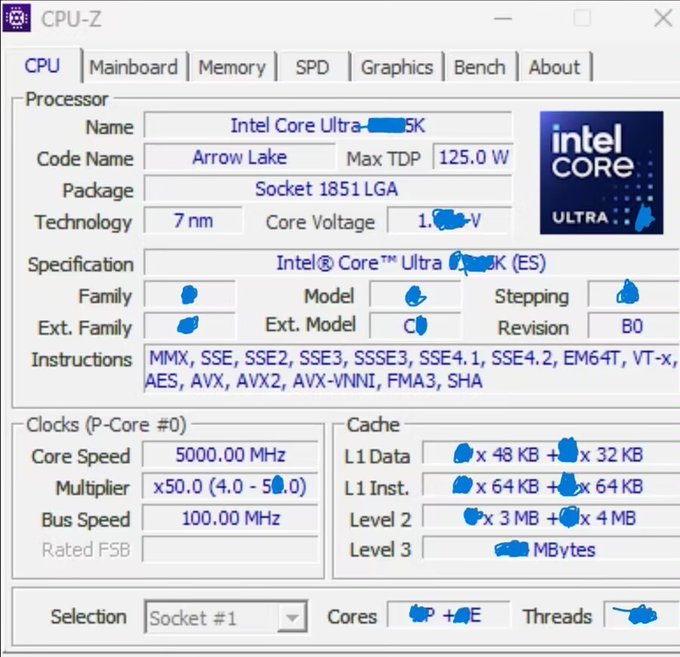
A mysterious Core Ultra K series engineering sample has made an appearance on CPU-Z. Алексей on X (Twitter) a screenshot of the mysterious part, with many of the critical system specifications blanked out to hide its true identity. Among the interesting findings is that the chip is listed with a 7nm node, denoting it uses the Intel 4 process, and lacks support for AVX-512.
The specs reveal that this particular engineering sample is made on the B0 revision of silicon and uses Intel's next-generation LGA 1851 socket. Multiplier specs show that the maximum boost clock is somewhere in the 5GHz range, similar to Intel's outgoing 13th and 14th Gen processors.
pic.twitter.com/59hZ91TxWrJuly 23, 2024
The model in question could be any of the three K SKU parts we know of right now. Previous leaks have unveiled three unlocked K-series variants for Arrow Lake-S: the flagship Core Ultra 9 285K, Core Ultra 7 265K, and Core Ultra 5 245 K. The Core Ultra 9 285K will purportedly have 8 Lion Cove P-cores and 16 Skymont E-cores, Core Ultra 7 285K will have 8 P-cores and 12 E-cores, and Core Ultra 5 245K will come with 6 P-cores and 8 E-cores.
One of the most interesting tidbits from the CPU-Z screenshot is the lack of hardware-accelerated AVX-512, as noted in the CPU-Z instructions entries. This little detail suggests that Intel is once again derailing AVX-512 for another generation, leaving AMD's competing Ryzen 9000 series processors as the sole models to support the full-fat AVX-512 acceleration units.
This is not the first time Intel has removed AVX-512 functionality from its hybrid CPUs. Intel began pulling AVX-512 support, starting with Alder Lake, due to complications that stemmed from Intel's decision to include AVX-512 support in its Golden Cove P-cores but remove it entirely from its Gracemount E-cores to save space.
The lack of AVX-512 support on the Gracemount cores forced Intel to completely remove AVX-512 support from Alder Lake CPUs altogether. However, the first batches of Alder Lake CPUs (and motherboard BIOS firmware) ironically allowed you to run AVX-512 instructions. The only caveat is that users had to disable the E-cores from the BIOS first for AVX-512 to work. Eventually, Intel culled this workaround entirely by first disabling AVX-512 enablement in firmware and then fusing it off physically on newer Alder Lake batches.
This trend continued to Raptor Lake/Raptor Lake Refresh, and now it appears to be making its way to Arrow Lake-S. This is pretty disappointing since AMD has enabled full 512-bit acceleration paths for AVX-512 with its Zen 5 and Zen 5c cores. The icing on the cake is that AMD can also run AVX-512 with minimal to no penalty to clock speed, which is a far cry from Intel's chips, which have had to reduce clock speeds when running AVX-512 instructions to prevent the CPUs from overheating.







